#i'm literally about to graduate with a degree in marine science
Explore tagged Tumblr posts
Text
endless ocean fans circa 2010-2024: it's so over
endless ocean fans on february 21 2024:
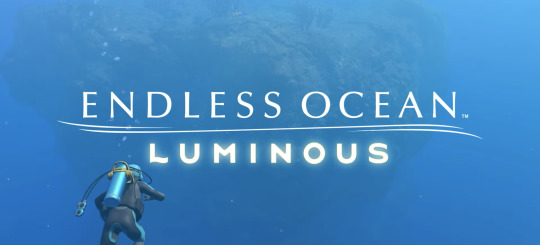
WE ARE SO FUCKING BACK
#endless ocean#endless ocean luminous#im going to SHIT MYSELF#i had to take a few laps to compose myself#HOLY!!!! FUCKING!!!! SHIT!!!!!!#i'm literally about to graduate with a degree in marine science#as a direct result of this game#im.
102 notes
·
View notes
Text
What they would study in college
Universe: Modern AU Characters: Eren, Armin, Mikasa, Jean, Marco, Connie, Sasha, Reiner, Berthold, Annie, Ymir, Historia, Levi, Hanji, Erwin Warnings: none
Eren
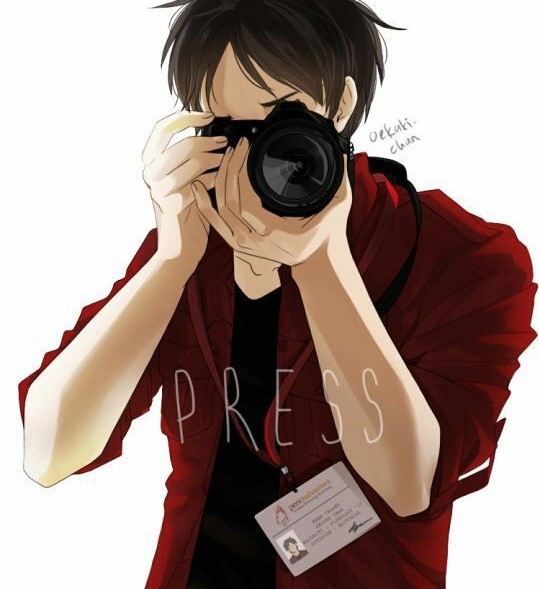
Okay I’ve read a lot of headcanons about the subject and according to almost everyone Eren wouldn’t go to college, but would rather join the army (particularly in the air force). I actually disagree: canonically Eren became a soldier after his mother's death, to join the Survey Corps and exterminate the titans, but he previously wanted to be part of the Scouts to be able to explore the world outside the Walls. He has a strong sense of justice and spends much of the time proving that he wants to fight for the weaker regardless of how strong or powerful his opponent is. I see Eren as the type who wants to defend the people even in a modern universe, so I think he’d study journalism or something similar.
Armin
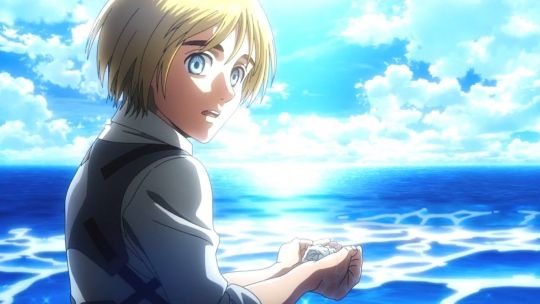
This little precious boy is obsessed with nature. He literally spends three whole seasons repeating that he wants to see the sea, the desert, the volcanoes, etc... He’s certainly passionate about natural sciences, so he would study something related to them, such as geology or marine biology.
Mikasa
Mikasa is very difficult to identify in a modern universe. We know her as the strong, introvert girl that always stick to Eren because of her past with him (I’m referring to when he saved her), but in a modern universe they’re unlikely to meet in such circumstances. What I believe would remain in her personality even in a normal world would certainly be her determination and a cool head even in the most difficult situations. With these characteristics she could easily graduate from medical school, specializing in something like neurosurgery.
Jean
Okay, for Jean it was a bit complicated. He’s an insecure guy, who wants to cover his weaknesses with the image of the strong man and that ‘I don’t give a fuck’ attitude; deep down he’s sweet, caring and attentive, we all agree on this. BUT, we can’t deny that Jean-boy is still one who likes to be watched, looking for approval. I see him studying acting, to work in the cinema or on television. I know that he’s really good at drawing but I don’t think he’d make it a job, it’s more likely to be a hobby for him.
Connie
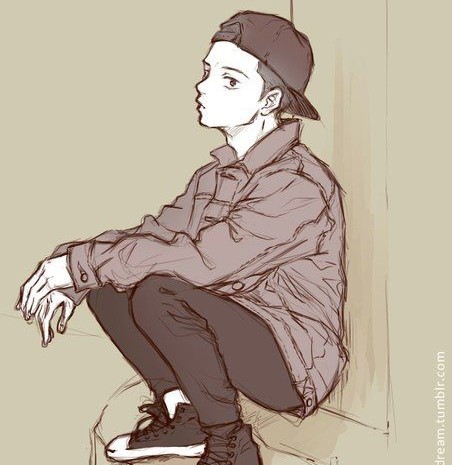
Connie is the stereotype of the goofy college student who doesn't want to get too busy with intellectual subjects, but at the same time it's hard to imagine him solving complicated equations or speculating on the stock market. I see him as one to study something mechanically repetitive, where the only way to improve is constant practice (he must be good with manual subjects, let’s remember that he has earned a place among the top 10 cadets). He’s probably prone to study programming or computer coding. (The image of him wearing a cap backwards, a pair of headphones and sitting with his reversed chair while typing on his computer is just perfect).
Sasha
Biological farming, or anything relating to that and the green-sustainable. We all know Sasha as the ‘potato-girl’ and the only one who can bite her best friend’s hand thinking it’s actual meat and going on with chewing it (poor Jean). But she also lived in the forest for a big part of her life, living with her family in a small village in the woods; so I think that she’d be particularly sensitive to respecting the environment and looking for measures to make agriculture and livestock sustainable.
Reiner
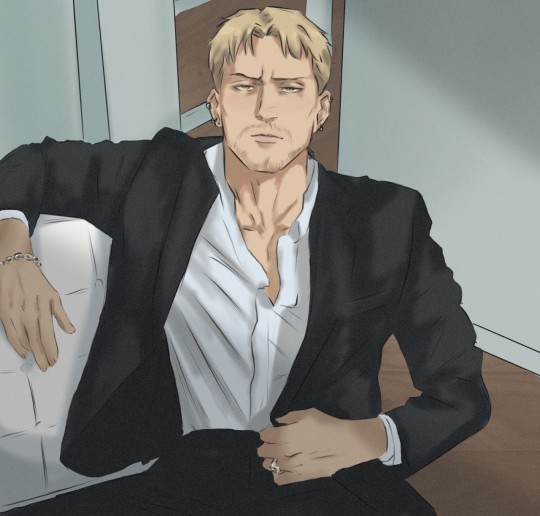
He's the man everybody can rely on cough cough whatever, he's the good soldier and the friend always ready to help a comrade in difficulty. He'd definitely become a manager, a CEO or something similar, so I'd assign to Reiner Braun a degree in Business Management/Administration. Plus: I'm not the type for a man in a suit, but hey, let me just say this: his shoulders under a white shirt while he adjusts his sleeves above the elbow. Give us those biceps, dude!
Berthold
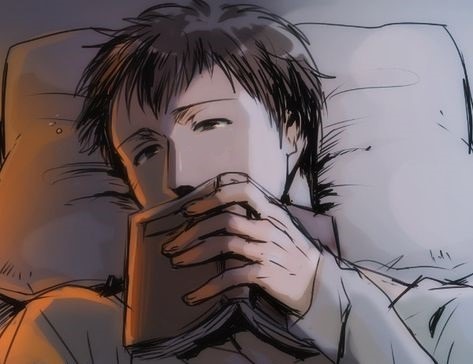
So, Berthold is always calm and quiet (even as the Colossal Titan he doesn’t roar even once); in the anime, his personality is not particularly developed regarding his interests, or maybe I missed something. But for what little we've seen he's obviously highly sensitive. This type of behavior makes me think that he needs an outlet and I imagine it in the writing. I don't know why but in my head the image of him as the reserved guy that pours what he thinks and feels in words it's quite suiting. So in college he'd study literature and simultaneously take courses of creative writing, even if, of course, he'd need a lot of support from his close friends, such as Reiner. (I also see him confessing to Annie with a letter).
Annie
She’s calm, reserved and perfectly capable of gaining respect from others with little effort, she reflects the image of a strong and independent woman. The two special episodes dedicated to Annie follow her as she searches for a missing girl, when she is put in charge of the investigation by the father of hers. With these premises it would be easy to place her in the sphere of law enforcement, in particular she would be perfect for the role of detective (not to mention her skills in hand-to-hand combat, this woman would become the terror of the whole police department). But to stick more accurately to the subject of 'college' she could study law to become a lawyer.
Ymir
She probably would like to be as close to the pussy as possible, I think she’d study medicine to become a gynecologist. Sorry, it's really a pitiful reason compared to the others, but in a certain way I see her with the white jacket intent on visiting her patients, she would also be very professional and no one else would see her Historia.
Historia
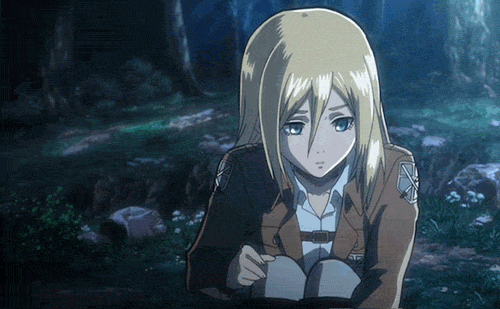
Historia is a character I personally like a lot; her growth is well made and I find in it a side of myself. Given that, rewatching some episodes made me notice that she really likes animals and taking care of them. From when she was a little girl she lived in the countryside with her mother and did the hard work so I don't see her as someone to take easy degrees. With her love for nature I definitely see her as a zoologist or a veterinarian.
Marco
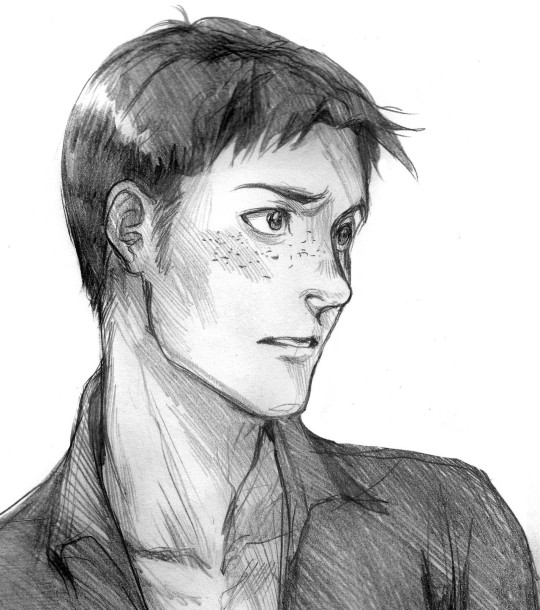
Marco is a little cute boy and he’s just too innocent for this world. I miss him. However, just as Berthold he’s sensitive but he’s more prone to show it without embarrassment than hide it to then let it out alone in his private sphere. In my opinion he has a talent for literary/artistic subjects and he could be inclined to write too, but at the same time I see him more active than the Colossal-boy. For what little we have known about him it’s pretty obvious that he’s super kind and wants to help other people. Traveling around my Uni’s possible degrees I found something that can actually suit him pretty fine: linguistic and cultural mediation.
Levi
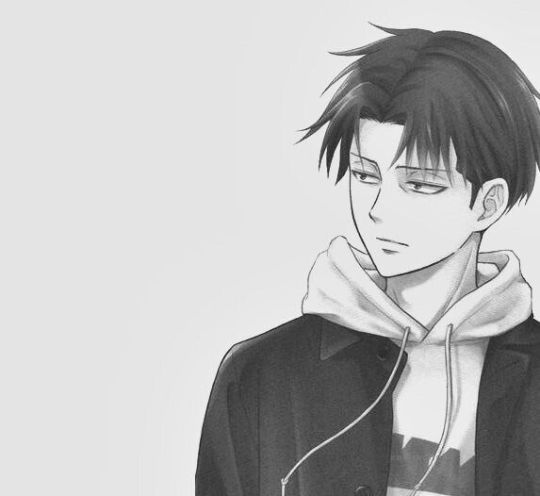
I think that, considering his past, a modern version of him could’ve been born when his mother was really young (and I mean 16 or 17 years old), so they wouldn’t have much money and he probably has to work during summer and right after diploma to gain enough money that would allow him a decent university (it’s not excluded that he will get a scholarship since he would surely be one of those brilliant students even with little commitment). And after securing the chance to study in my opinion he could get a degree in ‘I don’t-fucking-know’. Seriously, this is the hardest character. Reading others’ stories I found that almost everyone disagree about what Levi would study in college: some say medicine for his obsession with cleanliness (but on the one hand this mania has gradually disappeared over the course of the series and on the other it comes mainly from his Underground years, something that would not exist in the modern world), in some one-shots he studies engineering, and in others psychology, etc. Personally among all the ones I’ve read, he could be better suited to engineering. (But I'm still very confused about him so please leave some advice, I'll gladly accept them)
Hanji
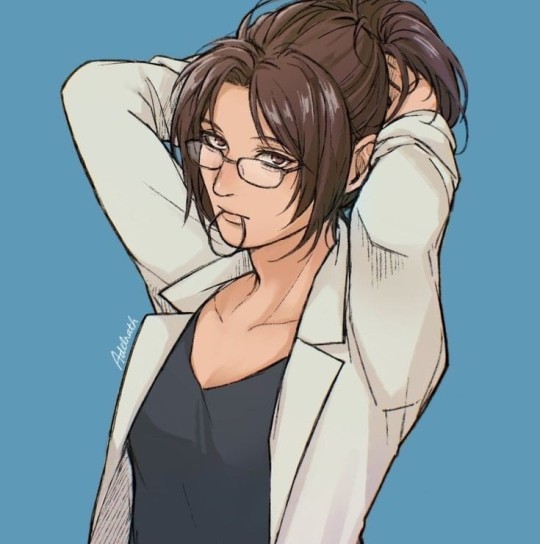
She is probably the easiest character. She’s canonically obsessed with the titan’s biology and she loves to do experiments on them. In short, Hanji would absolutely study biology; a lot of people said that with her love for experiments she’s more likely to get a degree in chemistry, but I see her more passionate about the study of living beings, so I think that biology fits her perfectly.
Erwin
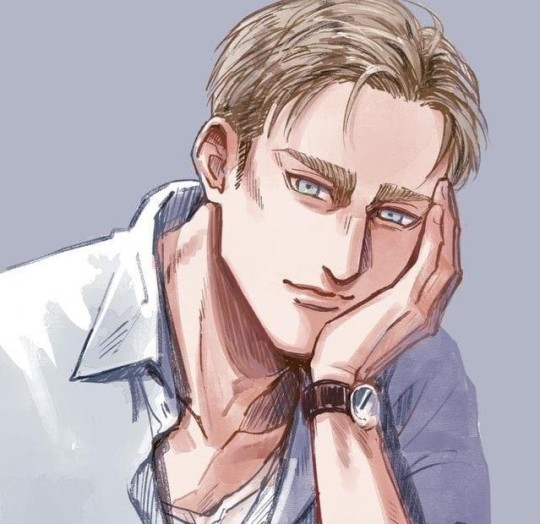
This man is certainly gifted for leadership and politics. In many ways he is similar to Eren in his ideals of justice and willingness to discover the truth, but unlike the boy who throws himself into battle even recklessly, we have rarely seen Erwin use the ODM gear to subjugate titans himself. In general, the commander of theSurvey Corps has always been rational and able to elaborate complex strategies to achieve a long-term result. He could graduate in political science or law. OR he could follow his father’s steps, becoming one of the few teachers who truly believe in their cause, with a strong interest in his students. However, it is certain that Erwin could never do a job he does not firmly believe in.
(I hate the fact that Tumblr allows only 10 images per post :() . Thank you so much for reading! If you liked this headcanon you can leave a like or a comment and if you have time you can check my Ao3. Hope you enjoyed!
#attack on titan#shingeki no kyojin#aot#aot headcanons#snk#eren jaeger#mikasa ackerman#armin arlert#jean kirschstein#marco bolt#connie springer#sasha braus#reiner braun#berthold hoover#annie leonhart#shingeki no kyojin ymir#historia reiss#krista lenz#levi ackerman#hanji zoe#hange zoe#erwin smith
78 notes
·
View notes
Text
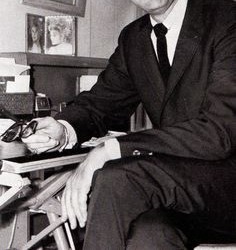
Stan the Man
Since the news of Stan Lee's death I've wanted to write something meaningful about my own feelings for him, what he represented to me as a creator and as a human being, and what kind of impact his life had on my life. For many reasons (I was dislocated by the Woolsley Fire and haven't fully settled down since our return) I haven't had a chance to give such an in-depth appraisal much thought. Honestly, I doubt I could do a full appraisal of Stan's importance in my life even under the best of circumstances. His work and presence as an icon and as a human being helped form who I am today. To write a full appreciation of Stan I'd have to write my autobiography.
Among my most vivid childhood memories is my discovery of the Fantastic Four with issue 4, the first appearance of the Sub-Mariner. I was nine years old, and I'd been a comic book reader for years at that point. I knew about Superman, I knew about Batman, I'd read the early issues of Justice League. I was a compulsive reader, voracious (still am)-- devoting hours a day to books and stories and comics and even my parents' newspapers. (Both my parents were avid readers. My dad read science fiction, my mom loved mysteries.) I vividly recall the astonished joy I felt when my mom took me to our local library and got me my first library card. I was six, I think, and the reality of a roomful of books just for kids seemed like a gift from heaven. I won all the reading awards at school-- any competition for reading the most books in a year was over as far as I was concerned the first week. By nine, I'd already graduated from "age appropriate" books for pre-teens to Heinlein's juveniles, Asimov's robot stories, and the collected Sherlock Holmes stories of Arthur Conan Doyle. I was a total reading nerd.
And then came Fantastic Four.
I've never been hit by lightning but I have to imagine the shock might be similar to what I experienced reading that early adventure of Reed Richards, Sue Storm, her kid brother Johnny, and Ben Grimm. If you weren't a comic book reader at that time you cannot imagine the impact those stories had. There's nothing comparable in the modern reader's experience of comics-- nothing remotely as transformative. (To be fair, I suppose both "The Dark Knight Returns" and "Watchmen" come close, but both remarkable works built on prior tradition and were perhaps a fulfillment of potential and creative expectations. The Fantastic Four was _sui generis_.) Over a series of perhaps five issues, a single year, Stan and Jack Kirby transformed superhero comics in an act of creative alchemy similar to transmuting lead into gold, and just as unlikely.
They also changed my life. Because Stan credited himself as writer and Jack as artist, he opened my nine year old eyes to a possibility I'd never really considered before: I could be something called a comic book "writer" or "artist."
Think about that, for a moment. Before Stan regularly began giving credits to writers and artists, comics (with a few exceptions) were produced anonymously. Who wrote and drew Superman? Who wrote and drew Donald Duck? Who wrote and drew Archie? Who knew? (Serious older fans knew, of course, but as far as the average reader or disinterested bystander knew, most comics popped into existence spontaneously, like flowers, or in some eyes, weeds.)
Stan did more than create a fictional universe, more than create an approach to superhero storytelling and mythology-- he created the concept of comic book story creation itself. Through his promotion of the Marvel Bullpen, with his identification of the creative personalities who wrote and drew Marvel's books, he sparked the idea that writing and drawing comics was something ordinary people did every day. (Yes, yes, to a degree Bill Gaines had done something similar with EC Comic's in-house fan pages, but let's be honest, EC never had the overwhelming impact on a mass audience that Marvel had later.) He made the creation of comic book stories something anyone could aspire to do _as a potential career_.
That's huge. It gave rise to a generation of creative talent whose ambition was to create comics. Prior to the 1960s, writing and drawing comic books wasn't something any writer or artist generally aspired to (obviously there were exceptions). Almost every professional comic book artist was an aspiring newspaper syndicated strip artist or an aspiring magazine illustrator. (Again, there were exceptions.) Almost every professional comic book writer was also a writer for pulp magazines or paperback thrillers. (Edmond Hamilton, Otto Binder, Gardner Fox, so many others-- all wrote for the pulps and paperbacks.) Comic book careers weren't something you aimed to achieve; they were where you ended up when you failed to reach your goal.
Even Stan, prior to the Fantastic Four, felt this way. It's an essential part of his legend: he wanted to quit comics because he felt it was stifling his creative potential, but his wife, Joan, suggested an alternative. Write the way you want to write. Write what you want to write. Write your own truth.
He did, and the rest, as the saying goes, is history.
When I picked up that issue of Fantastic Four, I was a nine year old boy with typical nine year old boy fantasies about what my life would be. Some were literal fantasies: I'd suggested to my dad a year or so earlier that we could turn the family car into the Batmobile and he could be Batman and I could be Robin and we could fight crime. After he passed on that idea I decided we could be like the Hardy family-- he could be a detective and I could be his amateur detective son, either Frank or Joe. Later I became more realistic and figured I could become an actor who played Frank or Joe Hardy in a Hardy Boy movie. In fact, by nine, my most realistic career fantasies involved either becoming an actor or an astronaut, and of the two, astronaut seemed like the more practical choice.
Stan and Marvel Comics gradually showed me a different path, a different possible career. By making comic books cool, by making them creatively enticing, and by making the people who created comics _real_ to readers-- Stan created the idea of a career creating comics.
Stan alone did this. We can argue over other aspects of his legacy-- debate whether he or his several collaborators were more important in the creation of this character or that piece of mythology-- but we can't argue about this. Without Stan's promotion of his fellow creatives at Marvel there would have been no lionizing of individual writers and artists in the 1960s. Without that promotion there would have been no visible role models for younger, future creators to emulate. Yes, some of us would still have wanted to create comics-- but I'd argue that the massive explosion of talent in the 1970s and later decades had its origin in Stan's innovative promotion of individual talents during the 1960s.
Nobody aspires to play in a rock band if they've never heard of a rock band. The Marvel Bullpen of the 1960s was comicdom's first rock band.
That was because of Stan.
For me, Stan's presence in the world gave direction and purpose to my creative life, and my creative life has given meaning and purpose to my personal life. I am the man I am today, and I've lived the life I've lived, because of him. From the age of nine on, I've followed the path I'm on because of Stan Lee. (So much of my personal life is entangled in choices I've made as a result of my career it's impossible for me to separate personal from professional.)
My personal relationship with Stan, which began when I was seventeen years old, is more complex and less enlightening. It's a truism your heroes always disappoint you, and I was often disappointed by Stan. Yet I never stopped admiring him for his best qualities, his innate goodness, his creative ambition and unparalleled instincts. People often asked me, "What's Stan really like?" For a long time I had a cynical answer, but in recent years I realized I was wrong. The Stan you saw in the media was, in fact, the real Stan: a sweet, earnest, basically decent man who wanted to do the right thing, who was as astounded by his success as anyone, and who was just modest enough to mock himself to let us know he was in on the joke. I imagine Stan was grateful for the luck of being the right man at the right place at the right time-- but it's true he _was_ the right man. No one else could have done what he did. The qualities of ego and self-interest that I sometimes decried in him were the same qualities needed for him to fulfill the role he played. In typical comic book story telling, his weaknesses were his strengths. And his strengths made him a legend and a leader for all who came after him-- particularly me.
This has been a rambling appreciation, I know. Scattered and disjointed. Like I said, trying to describe the impact Stan had on my life would require an autobiography.
When I started thinking about Stan in light of his death I realized, for the first time (and isn't this psychologically interesting?) that Stan was born just a year after my father. When I met him, as a teenager struggling with my own father as almost all teenage boys do, Stan probably affected me as a surrogate father figure. Unlike my own father, Stan was a symbol of the possibilities of a creative life. He was a role model for creative success, like other older men in my life at the time. But unlike them, he'd been a part of my life since I was nine years old. A surrogate father in fantasy before he partly became one in reality.
Now he's gone. Part of me goes with him, but the greater part of me, the life I've led and built under his influence, remains.
Like so much of the pop culture world we live in, I'm partly Stan's creation.
'Nuff said.
309 notes
·
View notes